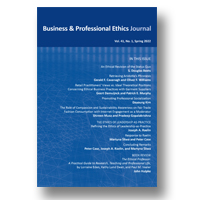|
2.
|
Business and Professional Ethics Journal:
Volume >
43 >
Issue: 2
S. Douglas Beets, Nathan Beets
Automate, Disrupt, and Profit:
The Ethics of Automation and Employment
abstract |
view |
rights & permissions
| cited by
Few doubt that automation and artificial intelligence will change business and society in the future. Questions arise, however, regarding the motivations associated with such expensive corporation expenditures and the related ethics of the disruption and unemployment that may result from corporation development and installation of sophisticated technology. This study analyzes financial statement data of 100 large public corporations to understand those motivations and their consequences for corporation profitability and employees. The study results indicate that a more automated future may be profitable for corporations and their shareholders, but one of the costs of that future is significant disruption to employees. While some new positions may be created as a result of this technology, many employees will suffer disruption and will need extensive training to maintain employment in an evolving workplace. Many other employees will lose their jobs because the tasks that they once performed will be automated. The related ethics to business and society are profound.
|
|
|
3.
|
Business and Professional Ethics Journal:
Volume >
43 >
Issue: 2
Wendelin Küpers, Kamel Mnisri
Integrating Embodied Ethos, Pathos, and Logos for Ethical Practices in Organizations
abstract |
view |
rights & permissions
| cited by
As a response to the decoupling of the ‘talk’ and the ‘walk’ in organizations regarding claimed goodness and actions, this contribution explores the role of the rhetorical modes of ethos, pathos, and logos as a new form of wise communication to handle timely ethical and societal issues. We develop a criticism of one-sided, often logos-oriented and instrumentalizing, irresponsible and unresponsive approaches taken by organizations in their communication efforts, and then go on to propose a more balanced, proto-wise integration of the three modes as part of embodied practice. We differentiate and reintegrate these rhetorical forms, and discuss them in relation to embodied, ethical and aesthetic practices that are qualified as responsible, responsive, and reasonable in and beyond organizations. Finally, some implications and perspectives on organizing an embodied, living ethos of sustainability are suggested.
|
|
|
4.
|
Business and Professional Ethics Journal:
Volume >
43 >
Issue: 2
Huseyin S. Kuyumcuoglu
Sweatshops, Disrespect, and Interference:
How to Interfere in Sweatshops without Disrespecting the Workers
abstract |
view |
rights & permissions
| cited by
Sweatshop defenders argue that interference in sweatshop conditions through consumer activism or government regulations is morally wrong because, first, such acts harm sweatshop workers, and second, they disrespect these workers. Distinguishing the prohibitive aspects of sweatshop interference as harm on the one hand, and disrespect on the other, these sweatshop defenders build both a consequentialist and a deontological foundation for their argument, respectively. This article crafts a rejoinder to the second foundation of the defenders’ argument. In particular, the article responds to the defenders against their argument that interference in sweatshop conditions might be morally impermissible because interferers disrespect workers with their activism. The ground of the defended argument is an ex ante interpretation of contractualist ethics.
|
|





